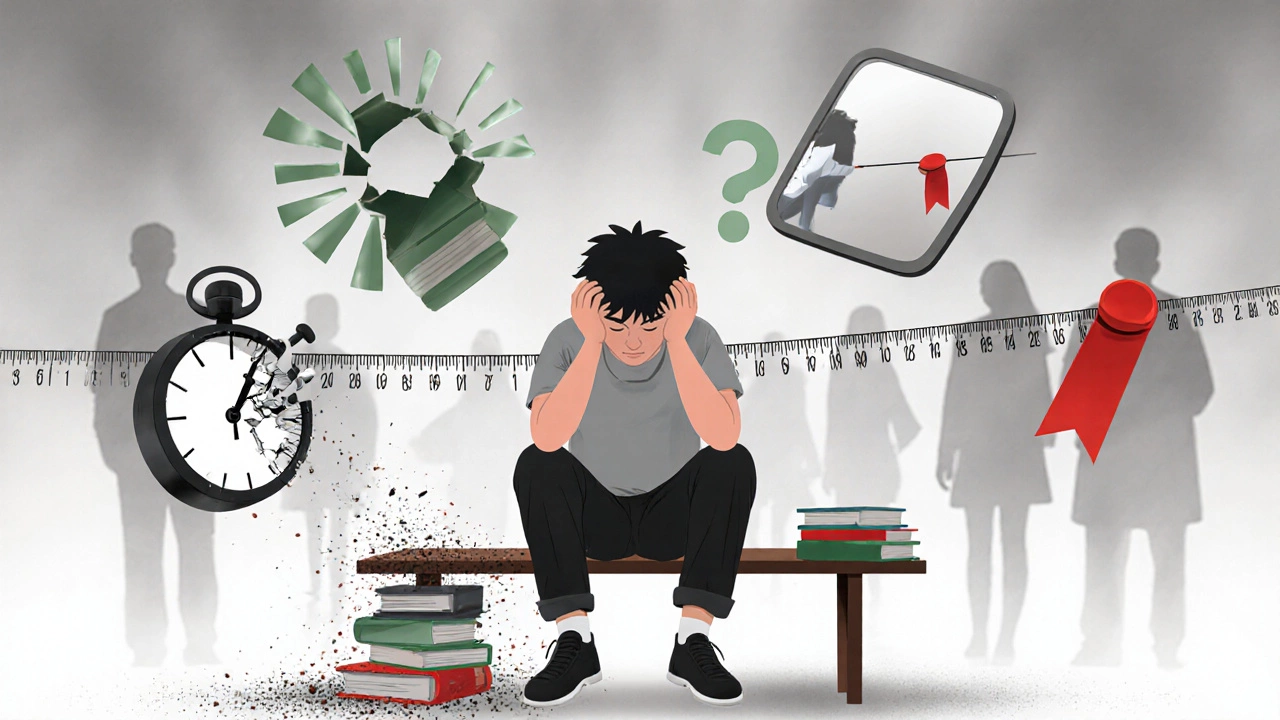Burnout Risk Calculator for Exam Preparation
How to Use This Tool
Answer these questions to calculate your burnout risk score. The higher your score, the greater your risk of burnout during exam preparation.
Your Burnout Risk Assessment
Ever felt your drive to win turning into a hidden trap? When preparing for competitive exams, that razor‑sharp hunger can feel like an engine, but it also fuels a set of problems most candidates overlook.
Competitive Person is a individual who constantly measures success against others and thrives on outperforming peers. While this mindset can push you to study longer and score higher, it also drags a shadow of drawbacks that can sabotage the very goals you chase.
1. Mental‑Health Toll
Constant comparison triggers a cascade of stress hormones. Exam Stress the anxiety experienced before, during, and after high‑stakes tests becomes chronic, leading to sleep disruption, irritability, and reduced concentration. A 2023 survey of 3,200 UK exam takers found that 68 % reported elevated anxiety levels, and 22 % said it interfered with daily functioning.
When the pressure mounts, Burnout a state of physical, emotional, and mental exhaustion caused by prolonged stress often follows. Symptoms include chronic fatigue, detachment from studies, and a sense of helplessness. Burnout doesn’t just lower scores; it can push students to consider quitting altogether.
2. Perfectionism Turns Into Paralysis
Competitive people habitually set unrealistically high standards. Perfectionism the relentless pursuit of flawlessness and overly critical self‑evaluation makes every mistake feel catastrophic. Instead of using errors as learning moments, you might freeze, replay the failure, and waste valuable revision time.
Research from the University of Birmingham (2022) showed that students with high perfectionist traits scored 12 % lower on practice tests when given tight deadlines, compared to peers with realistic standards. The fear of not being perfect can also lead to procrastination-ironically, the very opposite of what a competitive mindset promises.
3. Relationship Strain
When you constantly view classmates as rivals, collaboration suffers. Study groups become battlegrounds rather than support systems. This isolates you, reducing opportunities for peer‑learning and emotional support.
Social Relationships the network of friends, family, and peers that provide emotional and practical assistance are key buffers against stress. A 2021 longitudinal study linked strong social ties with a 30 % improvement in exam performance, highlighting that cooperation often outperforms cut‑throat competition.

4. Decision Fatigue & Over‑Planning
Competitive individuals tend to over‑analyze every question, every study schedule, and every mock test result. This hyper‑planning consumes mental bandwidth, leaving less energy for actual learning.
The phenomenon known as Decision Fatigue the deteriorating quality of decisions after a long session of decision‑making weakens focus during crucial exam periods. You might start a revision session intent on solving complex problems, only to abandon them halfway because your brain is too tired to stay sharp.
5. Impostor Syndrome-A Paradoxical Fear
Ironically, high‑achieving competitors often doubt their abilities. Impostor Syndrome the persistent feeling of being a fraud despite evidence of competence fuels a vicious loop: you push harder, feel more inadequate, and push even harder.
Data from the National Union of Students (NUS) indicates that 46 % of students who identify as highly competitive also report impostor feelings, compared with 19 % of their less‑competitive peers. This internal conflict erodes confidence just when you need it most.

6. Self‑Esteem Fluctuations
When your self‑worth is tied solely to rankings, any dip feels personal. A single low mock test score can trigger a cascade of negative self‑talk, decreasing motivation for subsequent study sessions.
Studies in educational psychology show that students with stable self‑esteem maintain consistent study habits, whereas those whose confidence swings with each result experience a 15 % drop in weekly study hours on average.
7. How to Balance Competitive Drive with Well‑Being
Recognizing the downsides is the first step. Below is a quick‑reference table that maps each disadvantage to a practical mitigation strategy.
| Disadvantage | Typical Impact | Mitigation |
|---|---|---|
| Exam Stress & Burnout | Sleep loss, concentration drop | Schedule short, mindful breaks; adopt 8‑hour sleep routine |
| Perfectionism | Paralysis, wasted time | Set "good enough" targets; use the 80/20 rule for study topics |
| Relationship Strain | Isolation, fewer support resources | Form study groups with clear collaboration rules; share notes openly |
| Decision Fatigue | Reduced focus on exam day | Limit daily to‑do list to 3‑4 priorities; automate routine tasks |
| Impostor Syndrome | Self‑doubt, anxiety spikes | Keep a "wins journal"; discuss feelings with a mentor or counselor |
| Self‑Esteem Swings | Motivation dips after setbacks | Separate identity from scores; practice self‑compassion exercises |
Beyond the table, here are three actionable habits that keep the competitive fire alive without burning you out:
- Chunk your study time. Work in 45‑minute bursts, then take a 10‑minute walk. This rhythm prevents mental fatigue.
- Celebrate small wins. After each mock test, note at least one improvement, no matter how tiny.
- Schedule a non‑academic activity weekly. Whether it’s a sport, music, or a coffee catch‑up, stepping away recharges your brain.
Remember, being competitive isn’t a flaw-it’s a powerful engine. The key is to install safety rails so the ride stays smooth and sustainable.
Frequently Asked Questions
Can competitiveness improve exam scores?
Yes, a healthy competitive drive can boost motivation and lead to longer study hours, which often translates into higher scores. The trick is to keep the drive balanced with self‑care.
How does perfectionism differ from high standards?
High standards allow room for mistakes and focus on progress; perfectionism demands flawlessness and punishes any error, leading to stress and procrastination.
What’s a quick technique to reduce exam anxiety?
The 4‑7‑8 breathing method (inhale 4 seconds, hold 7, exhale 8) can calm the nervous system within minutes and is easy to do anywhere.
Should I avoid group study if I’m highly competitive?
Not necessarily. Set clear, collaborative goals and treat peers as resources, not opponents. This protects relationships while still leveraging group insights.
How can I tell if I’m heading toward burnout?
Watch for chronic fatigue, loss of interest in studying, irritability, and declining performance despite longer hours. If two or more appear, it’s time to scale back and recover.
By acknowledging the downsides and applying these safeguards, you can keep your competitive edge sharp without sacrificing health, relationships, or long‑term success.
